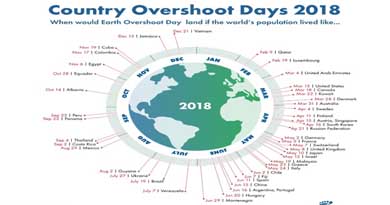Earth Overshoot Day marks the date in the year by when humanity will have consumed more from the planet, including food, fibres, timber, and absorption capacity for carbon dioxide from fossil fuel burning than the planet’s ecosystems can renew in the entire year. Schneider Electric believes that adoption of energy efficient and renewable technologies such as its IoT-enabled EcoStruxure platform, could move the date back by 21 days through retrofitting of existing building, industry and datacenter infrastructure and upgrading electricity production alone.
To demonstrate how this can be done and to promote new approaches to sustainable business thinking, the company has partnered with Global Footprint Network, the international research organization that is changing how the world manages its natural resources and responds to climate change. Global Footprint Network’s Ecological Footprint accounts enable to calculate Earth Overshoot Day.
Schneider Electric believes this situation is reversible. The company has calculated that if 100% of existing building, industry and datacenter infrastructure was equipped with active energy efficiency technologies that are readily available and the electric grid was upgraded with renewable capacities, the world could move the date back by at least 21 days.
“Operating on a planet with finite resources requires creativity and innovation,” said Xavier Houot, Schneider Electric’s SVP Global Environment. “We team up with our customers and partners to unlock the potential to retrofit existing infrastructure, adopting circular business models, and we measure how much this helps save resources and CO2. We work to see our growth path through the lens of the growing need of living within the means of our one planet.”
This challenge is central to Schneider Electric’s strategy, which is focused on EcoStruxure, the company’s ecoDesigned, IoT-enabled, plug and play, open, and interoperable architecture and platform, aimed at all power-consuming sectors, including Homes, Buildings, Data Centers, Infrastructure and Industries.
EcoStruxure Building is just one example of the platform in action. The technology can deliver up to 50% energy efficiency while reducing energy costs by 30%. EcoStruxure works on three key levels –
- Connected Products:In buildings, connected sensors and meters improve the efficiency of networked lighting, heating and air conditioning, enable to increase security and to optimize the use of space in the building;
- Edge Control:The layer gives users the capability to manage the data from IoT connected products on-site, with day-to-day optimization of energy consumption through remote access and advanced automation;
- Apps, Analytics & Services:Visualized reporting on energy consumption through interactive dashboards, detection and diagnosis of faults, performance analysis, and asset monitoring enable to detect additional energy efficiency opportunities and to transition from curative to predictive maintenance.
“Schneider Electric’s business case is aligned with moving humanity out of ecological overshoot, said Global Footprint Network CEO Mathis Wackernagel. Leading companies like Schneider Electric are rising to the challenge of managing natural resources differently, measuring them more accurately, and developing products and processes that use them not only more efficiently, but also reduce their overall use.”
To drive awareness of Earth Overshoot Day, Schneider Electric has partnered with Global Footprint Network to support its ambition to #MoveTheDate from August 1st to December 31s and beyond.
To promote Earth Overshoot Day, Schneider Electric invited attendees to a digital webinar on July 24th, 5 pm CET/ 8 am PST, led by Xavier Houot and Mathis Wackernagel, to discuss new approaches to sustainable business thinking. The session showcased inspiring examples and concrete strategies.





